Elevate Your New Year’s Resolutions for 2025
‘Tis the season for New Year’s resolutions! Joanne and I began our New Year’s Day by reflecting on the past year and setting intentions for 2025. I wanted to share some strategies and questions to make your goal-setting process more meaningful. Before diving into the details, let’s explore a few methods to ensure your resolutions truly stick.
Proven Strategies for Goal-Setting Success
Did you know that writing your goals down can increase your chances of achieving them by 40% to 50%? There’s something powerful about putting pen to paper—it engages your subconscious mind and helps clarify what you genuinely want. Typing on your phone or computer just isn’t the same! Once you’ve written your goals, share them with someone who can hold you accountable. Talking about your plans with a trusted friend or partner makes it much more likely you’ll follow through, especially if they check in on your progress.
Now that you’re ready to write down your goals and share them, there’s an important first step to take: reflection. It’s a step many of us skip, but it’s essential for setting intentions that truly matter.
A Crucial First Step: Reflect on the Past
Before you start setting goals, take some time to reflect on 2024. This step not only helps you identify areas for growth but also allows you to build on the successes and lessons of the past year. Joanne and I started our reflection with these two simple but impactful questions:
1. What brought you joy in 2024? Take a positive approach by recalling the moments and people that made you happy. Looking through the photos on your phone can help jog your memory and remind you of what you’d like to continue or expand in 2025.
2. What were your biggest challenges in 2024, and what did you learn from them? Reflecting on difficulties can reveal your resilience and highlight valuable lessons. Recognizing your growth can inspire you to set ambitious but achievable goals for the year ahead.
A Look Further Back: Your Biggest Memory of 2023
Here’s a fun challenge: try to recall your most significant memory from 2023. It’s surprising how quickly memories fade! Reflecting on this can help you focus on what truly matters for 2025. Before you start scrolling through old photos, take a moment to see what comes to mind naturally—it’s a great way to gauge what made the biggest impact on you.
Clarifying Your Vision for 2025
Once you’ve reflected on the past, it’s time to look ahead. Start by asking yourself a few key questions:
* What problems do you most want to solve? Identify small, actionable habits to address these problems. For example, if you want to stop snacking late at night, consider setting an alarm as a reminder or replacing the habit with something positive, like reading a book upstairs away from the kitchen.
* What discipline do you need support with?
* Which relationships need your focus in 2025?
Finally, take a moment to imagine your perfect day in 2025. Create two versions: one for a weekday and one for a weekend. Be realistic—your perfect day should reflect your current responsibilities and lifestyle. For instance, if driving your daughter to school is part of your routine, include that in your weekday scenario. Add as much detail as possible, from the time you wake up to when you go to bed.
Turning Reflection into Action
After answering these questions, you’ll have a clearer picture of what you want to achieve. Writing out your goals in specific categories can be helpful—think financial, business, personal, relationships, spiritual, and health. But remember, goals don’t have to be long lists of bullet points. Lately, Joanne and I have focused on setting goals that bring us joy and bring us closer to living our perfect day more often.
As a couple, supporting each other’s aspirations has deepened our connection. Helping Joanne achieve her goals brings me happiness, and together, we prioritize who we’re becoming, not just what we’re accomplishing.
Make 2025 Your Best Year Yet
The start of a new year is a chance to reflect, dream, and take action. Whether you’re tackling big goals or small habits, I hope these strategies help you approach 2025 with clarity and purpose. Here’s to a year filled with growth, joy, and meaningful progress!

The Ultimate Guide to Buying Your First Home: Steps and Tips for First-Time Homebuyers
Buying your first home is an exciting milestone, but it can also feel overwhelming if you’re unsure where to start. Even if you think you’re not ready, proper preparation can help you jump on the right opportunity when it comes. As experienced real estate agents, we’ve had the privilege of helping countless first-time buyers navigate this process. This guide will walk you through what to expect and how to prepare for the journey ahead. Let’s dive into the key steps of buying your first home!
Step 1: Assess Your Financial Situation to Determine Your Homebuying Budget
Before you start dreaming about your ideal home, you need to understand your financial situation. Knowing your credit score, monthly budget, and how much you can realistically afford are essential first steps. Take the time to review your financial standing. This means looking at your savings, debts, and any other expenses that may impact your mortgage eligibility.
A great starting point is to connect with a lender. They can help you figure out how much you can borrow and set realistic expectations before you begin your house search. Pre-approval strengthens your offer later and shows sellers that you’re serious about buying.
Step 2: Get Pre-Approved for a Mortgage to Speed Up the Process
Getting pre-approved for a mortgage is crucial in today’s competitive market. It shows sellers that you are a legitimate buyer and helps you set a concrete budget for your house hunt. The pre-approval process involves submitting financial documents such as tax returns, pay stubs, bank statements, and employment verification.
If you haven’t yet chosen a lender, don’t worry! We work closely with trusted mortgage professionals who specialize in helping first-time buyers. Getting pre-approved also means you’ll know exactly what kind of mortgage you qualify for, giving you confidence as you start your search.
Step 3: Identify Your Needs vs. Wants in a Home
Now comes the fun part—imagining what your new home will look like! But first, you’ll need to distinguish between your “must-haves” and your “nice-to-haves.” For instance, do you need three bedrooms, or could you get by with two? Is a large backyard essential, or could a smaller one work if the house is in the right neighborhood?
Listing your needs and wants helps streamline your search and ensures you don’t get distracted by features that aren’t necessary. This will keep you focused and prevent any future regrets.
Step 4: Start Touring Homes That Fit Your Criteria
House hunting can be one of the most enjoyable parts of the process, but it can also be overwhelming. We can guide you through various neighborhoods and homes that meet your criteria. As exciting as it can be to tour different properties, remember to stay grounded in your budget and priorities.
It’s normal to have to make compromises, but don’t feel pressured into buying a home that doesn’t meet your most important needs. With patience, you’ll find a house that checks off most of the boxes!
Step 5: Make an Offer on Your Dream Home
Found the perfect home? Great! Now it’s time to make an offer. This is where things can get a little nerve-wracking, but don’t worry—we’re here to help you craft a competitive offer based on current market trends and property value.
We’ll negotiate on your behalf, whether it’s the final purchase price, closing costs, or contingencies, to ensure you get the best possible deal. And remember, it’s not just about offering the highest price but also about presenting the most appealing terms to the seller.
Step 6: Conduct a Home Inspection Before You Finalize the Deal
Once your offer is accepted, the next crucial step is the home inspection. A professional home inspector will assess the property to ensure there are no major structural or mechanical issues. The inspection will give you peace of mind and help you avoid any unwanted surprises after closing.
If the inspection uncovers any problems, we’ll help negotiate repairs or price adjustments to address these issues. After this, you’ll be ready to move forward with the closing process.
Step 7: Close the Deal and Get the Keys to Your New Home
The final step is closing, where you’ll finalize your mortgage and sign all the necessary paperwork. Once everything is completed, you’ll receive the keys to your new home.
Congratulations, you’re officially a homeowner!
Final Thoughts: Your Journey to Homeownership
Buying your first home can feel intimidating at times, but with the right preparation and guidance, it’s one of the most rewarding experiences. From setting a budget to closing the deal, each step is essential in making your homeownership dreams come true.
If you’re thinking about taking the plunge or simply want to learn more about the process, feel free to reach out. We’re here to guide you every step of the way, turning your homeownership dreams into reality!
Frequently Asked Questions (FAQs)
1. How much should I save for a down payment on my first home?
Typically, first-time homebuyers should aim for a down payment of at least 5% to 20% of the home’s purchase price. However, some loan programs offer lower down payment options.
2. How does getting pre-approved for a mortgage help?
A mortgage pre-approval helps you understand your borrowing power, sets your budget, and strengthens your offer when bidding on a home.
3. What should I prioritize when house hunting?
Focus on your needs first—such as location, size, and budget. Wants like extra space or luxury finishes can come second to make sure you stay within budget.
4. How long does the home-buying process take?
From start to finish, the home-buying process typically takes 30 to 60 days, depending on factors like loan approval and the local housing market.
5. Is a home inspection necessary?
Yes! A home inspection ensures there are no hidden issues with the property that could cause problems later. It’s a crucial step before finalizing any purchase.
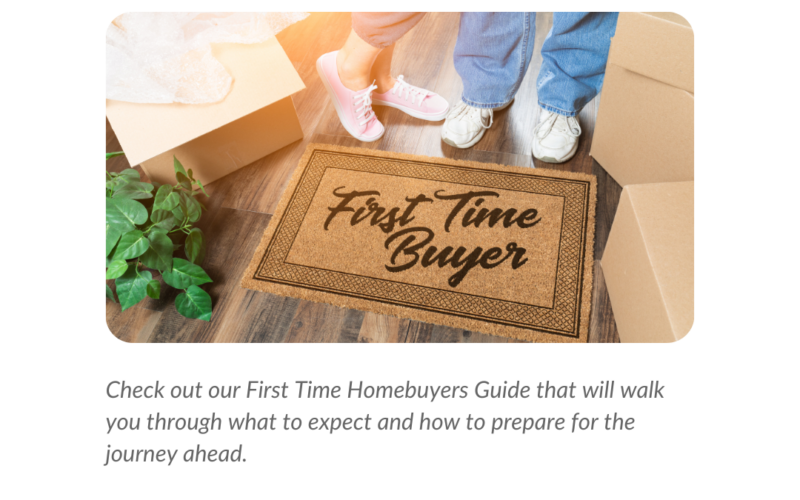
Understanding Recent Changes in Real Estate Compensation: What Buyers and Sellers Need to Know
On August 17, a historic change reshaped real estate transactions, following a settlement by the National Association of Realtors (NAR). This impacts how compensation is handled, bringing more transparency to the process for both buyers and sellers. But what exactly has changed, and how does it affect you as a consumer of real estate services?
Understanding the Changes in Real Estate Compensation
While compensation in real estate transactions has always been negotiable, the way this compensation is paid might change. When selling a home, the homeowner now has a choice of whether to pay a buyer’s agent or not. This option has always existed, but a recent lawsuit and the resulting rule change have drawn more attention to it.
Benefits for Consumers
This shift is advantageous for consumers as it brings more transparency and disclosure about who pays what and how much. For professional real estate agents, this change also highlights their value—or lack thereof—to consumers.
To enhance this transparency, the Georgia Association of Realtors has updated the forms used in transactions. For instance, the Exclusive Seller Brokerage Engagement Agreement, the document used to engage a client when marketing and selling their home, now provides more details about compensation paid to both the seller’s broker and the buyer’s broker. Real estate professionals can now better explain how compensation works, the choices sellers have, and the pros and cons of offering or not offering compensation to a buyer’s broker. Ideally, this conversation should have been happening even before the rule change, but that was not always the case.
New Requirement for Buyers
Another significant rule change requires buyers to sign an agreement with their real estate agent before they start looking at homes, whether in person or virtually. This document has been in use by many Realtors, including The Curtin Team, but is now mandatory. The Georgia Association of Realtors has updated this document to clearly state the compensation the buyer’s broker will receive. Known as the Exclusive Buyer Brokerage Engagement, this document outlines scenarios where a buyer’s broker may be compensated, whether directly from the buyer, the seller, or the seller’s broker, and specifies the amount and services covered.
At The Curtin Team, we have always trained our partner agents to begin a relationship with a buyer by meeting to understand their goals and educate them on the process—including how we are compensated and the benefits of signing an engagement to work together.
Types of Compensation for Buyer’s Brokers
Compensation for brokers working with buyers can take various forms, including but not limited to:
– A fixed-fee commission paid directly by the buyers.
– Concessions from the seller.
– A portion of the listing broker’s compensation.
I am thrilled that this practice is now required, bringing more transparency to our industry. I believe it will elevate professionalism and encourage those who may not best serve buyer clients to pursue other directions. This change presents an opportunity to showcase our value.
Industry Impact
“This isn’t a significant shift for us, but our industry has never seen anything like this,” said Joanne Curtin, Founder of The Curtin Team. “We have more buyers coming to us now seeking expert guidance, and we are confident in providing a superior customer experience by having these conversations and highlighting potential value gaps between Realtors,” she added.
We are already seeing a shift in buyer engagement and increased transparency. Buyers might want to limit the number of days they agree to the engagement or restrict the contract to specific homes.
Changes in Communicating Compensation
Another new rule states that offers of compensation cannot be communicated on Multiple Listing Services (MLS). What does this mean? If a listing broker gets a seller’s approval to make an offer of compensation to a buyer’s broker, it cannot be shared on an MLS. However, it can be communicated through other marketing avenues. Therefore, it is more crucial than ever to hire a real estate professional with a strong marketing presence and a solid local agent network.
Benefits of Offers of Compensation
Offers of compensation benefit both buyers and sellers. For buyers, it ensures access to representation throughout the homebuying process, helping them achieve homeownership on terms that best suit them. For sellers, it attracts more buyers and broadens the pool of prospective buyers by lowering the barrier for those who may not be able to afford to pay buyer agent compensation out of pocket.
For Sellers
Compensation is negotiable. The amount you pay should reflect the value you receive. Your real estate professional should guide you through the available options and help you make the best choice for your home sale. Trust your real estate professional, but if they cannot clearly explain your options and justify their compensation, seek a second opinion.
For Buyers
In Georgia, it’s “buyer beware.” Due diligence falls on the buyer, so having a professional guide you is wise. Asking a Realtor to show you a home without signing an agreement is not an option. If someone is willing to break the law and do it anyway, consider whether that is the person you want representing your best interests. Now more than ever, a strong relationship with an experienced real estate team is crucial!
We are here to answer your questions and provide guidance. Please reach out if we can assist you.
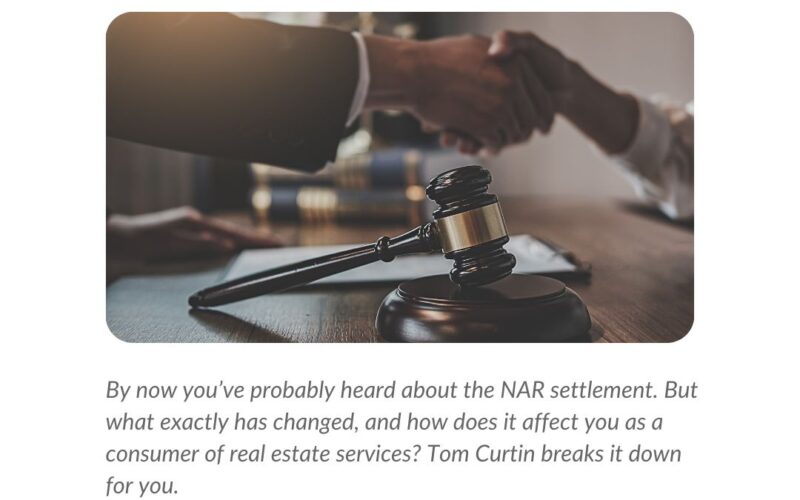
Agent Spotlight Interview – Heather Woodruff
In this Agent Spotlight video meet Heather Woodruff, a dedicated buyer’s agent on the Curtin Team. Originally from Boston, Heather made the exciting move to Georgia with her family, bringing her extensive real estate experience from the Boston market to the vibrant communities of Alpharetta, Roswell, and East Cobb.
Heather shares her journey of restarting her business in Georgia and the joy she finds in exploring her new surroundings. The move has brought her closer to extended family, and she loves the friendly atmosphere and beautiful spring weather of the South.
Before embarking on her real estate career, Heather was a pediatric physical therapist. Her passion for helping others seamlessly transitioned into real estate when she sold her own home and fell in love with the process. This inspired her to make a significant career change and become a realtor.
Heather holds several special designations in real estate, including being an Accredited Buyer’s Representative (ABR), Seniors Real Estate Specialist (SRES), Real Estate Collaboration Specialist in Divorce (RCS-D), and certified Real Estate Negotiation Expert (RENE). Her genuine love for getting to know people and her attentive listening skills make her an exceptional agent who truly cares about her clients’ needs.
Don’t forget to like, comment, and subscribe to the Curtin Team channel to stay updated on more enriching content like this!
WATCH THE FULL EPISODE HERE
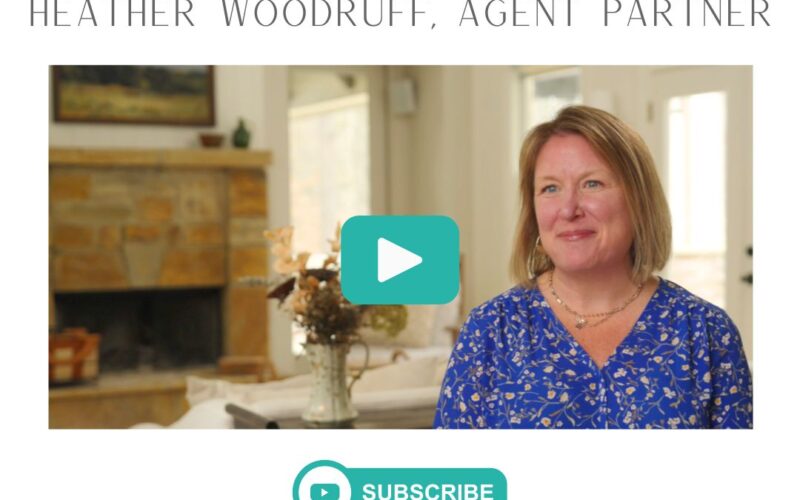
A Father’s Real Estate Wisdom: Investment Tips for My Kids
Hey Kids,
As you start exploring the world of real estate investment, I want to share some insights I’ve picked up over the years. Our hometown of Roswell offers opportunities for smart investments. Here are a few tips to help you navigate the real estate landscape and find your own path to success.
Roswell is famous for its beautiful historic homes, top-rated schools, and cool vibe. When thinking about investments, it’s important to understand what makes this area special. Check out market trends, property values, and neighborhood vibes. Keep an eye on new businesses, infrastructure projects, and zoning changes that can boost property values.
You’ve probably heard this a million times, but it’s true: location is everything in real estate. In Roswell, great locations often mean being close to excellent schools, parks, shopping centers, and restaurants. Look for properties in areas like Historic Roswell or nice established neighborhoods. A prime location can make a big difference in rental income and property value.
While Roswell has plenty to offer, it’s smart to diversify your real estate portfolio. Think about a mix of property types—single-family homes, townhouses, even commercial properties. Each type comes with its own perks and risks. Diversifying helps protect against market ups and downs and gives you a balanced approach to building wealth.
When looking at potential investments, check out the condition of the property. Older homes in Roswell might need some work, but they can be real gems if renovated properly. Look for places with room for improvement, like cosmetic updates or expansions. Investing in well-maintained properties or those with high potential can really pay off.
Tap into the expertise of local Realtors (like your ol’ dad here), property managers, and contractors. Their knowledge can give you valuable insights and help you make smart decisions. Networking with these pros can also lead you to off-market deals and opportunities you might not find on your own.
While short-term gains are tempting, real estate is often most rewarding when you think long-term. Consider how property values might appreciate over time and look for areas with strong growth potential. Buy real estate and wait, time will do the rest. Even if you don’t get a screaming deal when you purchase,over time you’re investment will continue to increase. Roswell’s mix of historic charm and modern amenities makes it a great place for long-term investment. Hold onto properties that are likely to grow in value and provide steady rental income. Don’t be tempted to sell with market ups and downs, stay the course.
The real estate market is always changing, so staying informed is crucial. Keep up with local market trends, economic factors, and zoning law changes. Attend local real estate seminars and join investment groups to stay connected and learn new things. Being adaptable and ready to tweak your strategy based on market conditions will help you stay ahead.
Financing is a big part of real estate investment. Explore different options like traditional mortgages, home equity loans, and private lenders. Knowing the terms and conditions of each option and developing trusted relationships with lenders will help you make the best financial decisions. Keep an eye on interest rates and loan conditions, as they can greatly impact your returns. Sometimes it makes sense to buy and lock in a longer term low rate even if the price isn’t great.
Real estate investment isn’t just about making money; it’s also about improving quality of life. Think about how your investments can benefit the community and enhance your own quality of life. Treat your tenants and property well and this will pay dividends over time and lead to sustainable and rewarding investments.
Investing in real estate offers a unique mix of opportunities and rewards. By understanding the market, focusing on prime locations, diversifying your investments, and leveraging local expertise, you can build a successful real estate portfolio. Stay informed, think long-term, and remember the importance of quality of life. With these principles in mind, you’ll be well on your way to making smart and rewarding real estate investments.
I’m so proud of you for taking this step. Remember, this journey is as much about learning and growing as it is about financial success. Trust your instincts, stay curious, and never hesitate to ask for advice. Don’t wait to buy real estate, buy real estate and wait. Here’s to your future success!
With love and wisdom,
Dad
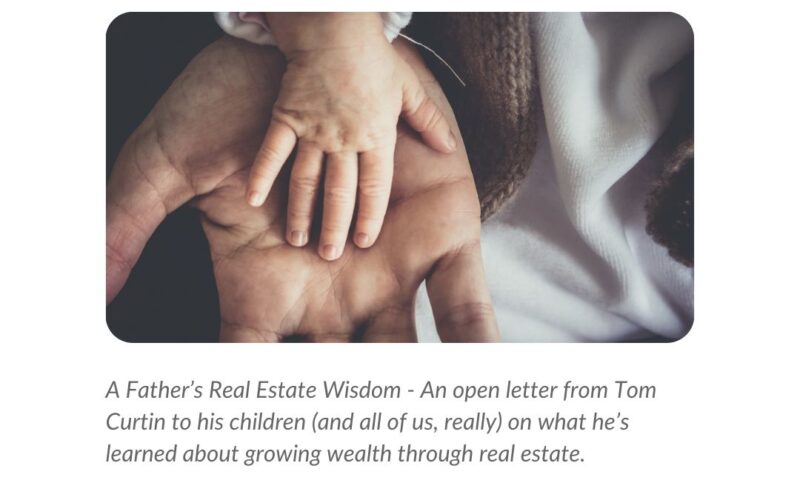
Opportunities in Real Estate: Learning from the Past
Remember your friends who bought a house right at the beginning of Covid 19? At the time, we thought it was risky, as time went on we see what an amazing opportunity it was to purchase. Similarly, we may be looking back at those friends who purchase in the first few months of 2024 in the same light. There’s hesitancy with Buyers right now between interest rates, an election year and uncertainty in the real estate market.
Our data points to a rising market. The Federal Reserve has already indicated they will ease interest rates in 2024. Waiting for lower rates, like the majority of Buyers will do, means you’ll likely pay more. That’s because as mortgage rates drop, housing demand will surge, driving prices up. As mortgage rates drop, Buyers will come flocking back into the market, driving up competition. So as prices rise, and competition rises, we will be back to multiple offers and Sellers back in the driver seat. There is a window now with a more balanced market. Over the next few months, Buyers don’t necessarily have to make a rushed decision with little due diligence period and reduced negotiating leverage, giving Buyers more time to make an informed decision.
Home prices in our area rose over 6% from the start of 2023. Home prices are expected to continue to rise throughout 2024. Several factors are contributing to home price appreciation in our area. Despite the new home construction that is going on all around us, the new home inventory is still falling short of the housing stock we need. This problem goes back to the recession of 2009-2011, home building came to a screeching halt. For 3 years, we didn’t see any new building, and builders haven’t closed that gap. Adding to that were supply chain issues caused by Covid 19, to some degree builders are still dealing with short supply and labor. There’s still not enough being built at a fast enough pace to meet demand. Couple this with the homeowners who are not willing to part with their 3% mortgage rate, there are not enough homes on the market. Supply and demand dictates prices. More supply of Buyers, less supply of homes equals rising prices. Additionally, we continue to have a healthy supply of Buyers relocating to our area from out of state, attracted to the lifestyle and affordability compared to many other metro areas. Many out of state Buyers purchase in the late Spring and Summer (choosing to move in between school sessions). Waiting will place you in direct competition with these Buyers who often have company support and a tight timeline, making for tough competition. Often they are willing to pay asking price or above to secure their housing quickly and get settled in their new job and state.
If you’re renting, and you’re financially able to purchase, you should consider buying now. The sooner you purchase a home, the sooner you start building equity through mortgage paydown and price appreciation. Your costs are fixed, unlike rent that is likely to be increased each year. And when mortgage rates fall, you can consider refinancing. There’s peace of mind having predictability with your monthly housing costs. Inflation, interest rates or a change in your landlord’s situation will not impact your housing or payment situation once you’ve locked into a fixed rate loan in your own home. There are tax advantages you may be missing as a renter as well. Consult with your CPA for how these tax breaks would apply to you as some income limitation may apply, here are a few common ones.
Mortgage Interest- you can deduct your mortgage interest.
Real Estate Taxes – you can deduct state and local taxes in the year you pay them.
Home Office Deduction – if you’re a small business owner who works from home and use part of your home exclusively for the primary place of business, you can deduct many home expenses.

“Behind the Curtin” Presents A Canton Street Townhome in Roswell, GA Episode 10
“Behind the Curtin” provides an inside look at local homeowners’ beautifully-crafted houses, giving insight into what it takes to renovate, upgrade, and style the most coveted parts of their dream homes. In this video series, industry expert and business owner Joanne Curtin explores local homes while interviewing their owners who live well in their homes to better understand their thought processes when making important decisions. Join Joanne to get a look into the world of luxurious real estate one wonderful home at a time.
“Behind the Curtin” Episode 10 – A Canton Street Townhome In Roswell, Georgia
WATCH THE FULL EPISODE HERE
In the latest episode of ‘Behind the Curtin,’ Joanne Curtin tours the extraordinary Canton Street townhome owned by world-traveler and collector extraordinaire, Russ Steinbeck. Join us as Russ unveils the enchanting secrets behind crafting his dream urban oasis.
Joanne: It’s a pleasure to talk to you today, Russ. Let’s begin by sharing with me where you lived before moving to downtown Roswell.
Russ: I was living in Greenwich, Connecticut in a great little 1940’s building known as LaFayette Court. There are dozens of restaurants, great shopping, a giant library, and a park. When I began looking in this area, I toured the areas around Avalon, Milton, and downtown Alpharetta and finally discovered Canton Street in Roswell. Canton Street has that same eclectic feel I enjoyed in Greenwich. I enjoy the authenticity here. And it’s all about walking. Where do you want to walk to? Do you know your neighbors? Being able to engage with people in the community of Roswell is the best I have ever found.
Joanne: Tell me about the particular townhome you chose.
Russ: The unit just absolutely gorgeous. The sunroom features these cast iron doors that swing open and it’s very spacious. It’s a great location. I can even use my own Wi-Fi across the street at Crazy Love Coffee House. Finding a place that you truly love is an extension of your personality. And this home gave me the freedom to bring in things I have enjoyed my whole life.
Joanne: What did this home have that you needed?
Russ: I needed to make it my own. I needed a place to enjoy different things I have collected over the years. Fortunately, I was able to travel to over 20 countries with my children. So, for example, I have a museum book from every museum we visited.
Joanne: What is your favorite room in your home?
Russ: It’s the sun porch. You get the fresh air and can relax by the fire with a good cigar. I think it’s the best room in the house.
Joanne: You told me that you are a collector. What are some finds that you love here?
Russ: The camera painting here is the same camera my dad used in Europe. These books were collected in Prague with my son. These photos are from my parents travels in Paris. And this original, signed Banksy that I got at an auction.
Joanne: Now that you’re settled in, is there anything you would have done differently?
Russ: I am in the process of sorting over 90,000 photos from our family travels and I am putting up more photos of my beautiful, talented, well-traveled kids.
Joanne: Do you have a second home?
Russ: Lots of people have a beach house. But since I hiked the Appalachian Trail while I was living in Connecticut I would like to get a piece of property halfway along the Trail so I can fly in, hike for a couple of days and come back.
Joanne: What lesson have you learned with this move?
Russ: You don’t need all the stuff you have. Figure out what’s important. Get rid of the rest. You don’t want your kids to have to go through boxes and boxes and boxes of stuff. Just keep the stuff that’s meaningful.
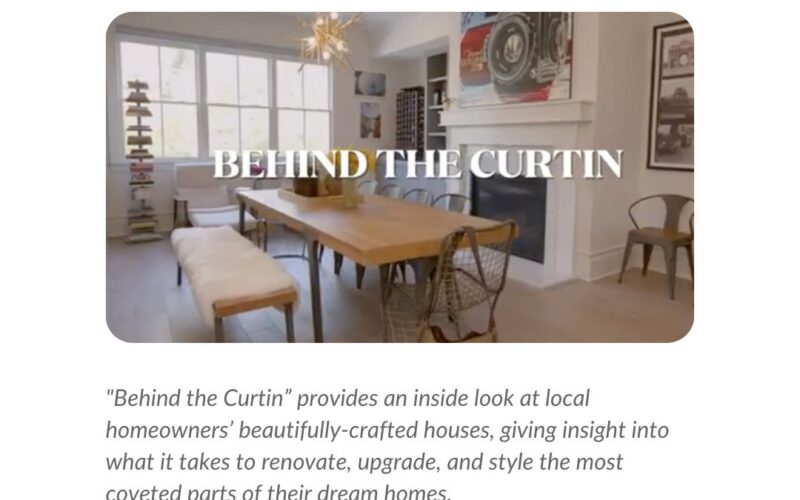
“Behind the Curtin” Presents A New Construction Home in Roswell, Georgia Episode 8
“Behind the Curtin” provides an inside look at local homeowners’ beautifully-crafted houses, giving insight into what it takes to renovate, upgrade, and style the most coveted parts of their dream homes. In this video series, industry expert and business owner Joanne Curtin explores local homes while interviewing their owners who live well in their homes to better understand their thought processes when making important decisions. Join Joanne to get a look into the world of luxurious real estate one wonderful home at a time.
“Behind the Curtin” Episode 8 – A New Construction Home in Roswell, Georgia
WATCH THE FULL EPISODE HERE
Max Reiboldt and his wife, Kay, built a new home across the street from where they were living. This short journey resulted in a huge transformation of their living space.
Joanne: Max and Kay, it is a pleasure to talk to you. I am excited to hear about where you lived before you built this home.
Kay: We lived on Fowler, just literally diagonally across the street. We liked the neighborhood so much that when this property became available, we latched on to it quickly. We wanted to be on one level, and we didn’t want much yard. When the builder realized that two homes could not be built on this lot, Max said, “Why not purchase the entire property?” So, we ended up with a larger lot than we expected.
Joanne: What does your new home have that your previous one didn’t have?
Kay: The problem we had at Fowler is that you could not get into that house without stairs. We needed all of our living space on one level, but we have six grandkids, and we thought, we really would like to have space for them if they all want to come and stay. We also built over the three-car garage. We added that additional space in case we need live in help to stay with us. Caregivers, nursing homes, they are so expensive, we thought it would be better to have space for someone to live here and we can stay in our home which is our goal.
Joanne: What is your favorite room in the house?
Kay: I think the whole downstairs – the kitchen, dining room, hallway. In the morning I love to sit in the hallway with the big windows and plants.
Max: We have an outside covered porch patio and pool and that is a nice setting and pretty enjoyable when the weather isn’t too hot or too cold. I also think the high 25-foot ceiling with a balcony view upstairs is a unique feature in this very custom home.
Joanne: So, upstairs is really for visitors and grandkids?
Max: We entertain quite a good bit actually. And each bedroom has a theme. For example, I am President of the Board of Directors of a medical missions effort serving central America, primarily Guatemala. And we’ve gone there so many times, we have named one of our guest rooms “The Guatemala Room” because we modeled it after some of the places we stay when we are there.
Kay: We have a purple room for our granddaughters. We also have a living room [on the second level] for the grandkids that has an arts and craft area. The third floor was actually not planned for anything more than storage. But we made it in to a game room where we have a pool table and we also have some extra storage up there as well.
Joanne: What is your favorite source for décor?
Kay: Working with our very talented interior designer, Christie, who has worked for HGTV and Netflix, I will buy something that I love and she will find a way to make it work. I love unique pieces and bargains! So, she and I are always on the hunt for a good sale. Locally, I pick up things at antique stores and sometimes I will find pieces online at Wayfair or Serena and Lily. I have a good friend and along with Christie’s assistant, we are able to purchase larger items that I could not transport on my own.
Joanne: What is a splurge in your home that you feel you couldn’t live without?
Kay: I can you right off the bat! It’s the master bathroom tile we had imported from Mexico.
Joanne: And, in your opinion, what is something that you feel someone should never skimp on?
Kay: I think flooring is something you need to get right. And it needs to be the right color, especially when you have a big open space. It has to go with everything. You don’t need to buy the most expensive stuff in the world, but you need to think about upkeep. I also think good quality furniture that will last for a long time is worth the investment.
Joanne: What would you say you and Max learned through the process of building this home?
Kay: Along with our vacation homes, we learned that location is very important. Here we are centrally located for our grandkids. We also learned that some of our original ideas changed as we built the home. For example, we originally planned for a simple little garden. But because of the drainage issues we had on the lot, it was necessary to build the house longer and route the drain system properly to keep the lots from flooding in heavy rain. And with the addition of an elevator, we can have multiple floors that I still have access to, even though we originally planned for a ranch-style home.
But I have to say, being prepared for additional costs that will inevitably come up is important. And be sure to have an attorney look over contracts with builders and vendors so that your financial interests are protected.

Tom and Joanne Curtin Discuss the History of the Curtin Team
Tom and Joanne Curtin discuss the history of the Curtin Team and how the lessons they learned have propelled them forward to build a successful real estate business in Roswell, Georgia. They discuss their success in real estate investments and outline steps they took to get there. They talk about how they committed fully to the decision to invest in real estate and emphasize taking action instead of waiting for the “perfect” opportunity.
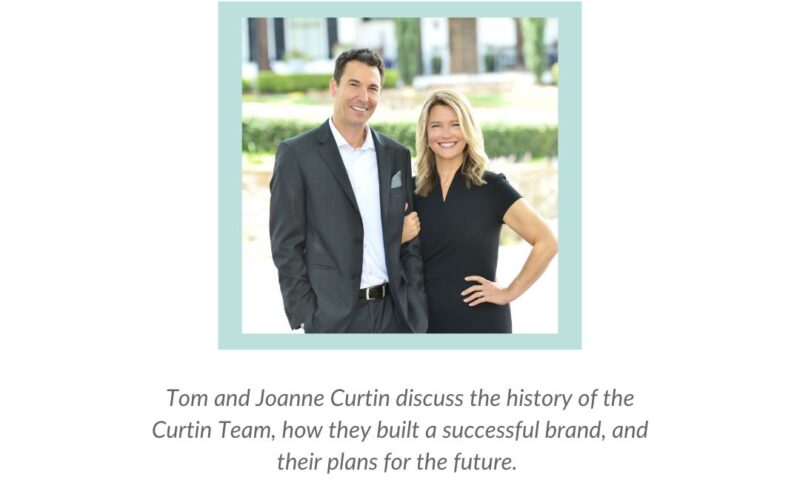
Tom and Christy Discuss First Time Home Buyers
The Curtin Team’s CEO, Tom Curtin and Director of Sales, Christy Smith explain the benefits for first time home buyers in today’s market. One of the biggest advantages of buying a home today is the stability and equity you get. Waiting a year or two can cost you tens of thousands of dollars in equity loss. And as rental rates continue to rise, a fixed rate mortgage payment stays the same. Also, many sellers and lenders are now offering to pay closing costs and buy downs on rates. Large down payments often scare off first time homebuyers, but some loans require as little as 3.5% down. As an example, the down payment on a $400,000 house can be as low as $14,000. And there are many ways to get that down payment including finding places in your budget to cut back and save, loans from family, or loans against a 401K to cover some or all it. The news of interest rate hikes shouldn’t scare off potential home buyers either. If rates go down, refinancing is available and if rates go up, you’ll be glad you locked in a lower rate.


